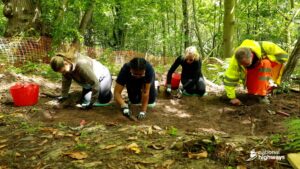Highways England has revealed it expects at least 22,000 people to work on the Lower Thames Crossing scheme, the country’s largest road programme since the M25 was built 35 years ago.
It says the new crossing will almost double road capacity between Kent and Essex, ease congestion across the region, and divert more than 13 million vehicles away from the Dartford Crossing each year, currently the only river crossing east of London. The scheme includes the longest road tunnels in the UK, 14.3 miles of new road, new viaducts, seven new bridges, and 24 miles of new paths.
It says delivery of this transformative project will support 10,000 jobs in the peak year of construction, and over the six-year building phase, it will employ more than 22,000 people, ranging from highly skilled engineers, architects, and designers, to other essential staff such as caterers, sign makers and IT support.
Highways England is currently developing a skills, employment and education strategy that will enable the delivery of the Lower Thames Crossing as well as support the long-term skills and employment needs of the local community.
The project has worked with Local Authorities and a wide range of stakeholders to understand their aspirations and the local skills market, so they can cultivate a workforce that can support these plans. The strategy will be published later this spring.
Matt Palmer, Lower Thames Crossing Executive Director, said, “By connecting people to jobs and businesses to customers, the Lower Thames Crossing will add billions to the local economy and play an important part in the Government’s plan to level up the UK. But it also has a more urgent and crucial role to play in our economic recovery by employing more than 22,000 people over the lifetime of its construction.
“Our aim to create local jobs, support local businesses, and nurture the next generation of talent, and in partnership with our contractors we have ambitious plans. We will create hundreds of apprentices and places for graduates and are offering free training to local businesses to help them work on this, or any other major infrastructure project. The scale of opportunity is huge, and I look forward sharing more detail on our approach and plans over the next few months.”
Kate Willard OBE, Thames Estuary Envoy, added, “As the largest road scheme in more than three decades, it would be hard to overstate the monumental impact the Lower Thames Crossing will have on the region. I am delighted that local people and businesses in the Thames Estuary are being given the opportunity to work on this transformative project.”
South East Local Enterprise Partnership Chair Christian Brodie commented, “Not only will this transformative project bring major employers in to the SELEP area, but it will also provide a range of opportunities for the South East’s SME community in terms of supply chain and service contracts. We are confident that these benefits will be particularly felt through the business communities adjacent to the crossing and will work with Highways England and our partner organisations in ensuring that this is the case.
“This is a hugely important infrastructure project for the South East that will improve our connectivity, and in turn create new opportunities for the local economies either side of the river. That it will also create such a significant number of jobs for the area is an incredibly welcome bonus, and particularly good news at this time when so many have been negatively affected by the COVID-19 pandemic.”
As well committing to thousands of hours in schools, the project team are creating resources for students, teachers to help inspire the next generation of UK talent – such as career profiles of apprentices and films showcasing why the industry is so exciting.
Highways England says it’s also building on its track record of supporting local businesses by helping firms across Kent and Essex prepare for the opportunities available. More than 100 business have already registered on a new SME directory that will be given to the main works contractors. Hundreds more local firms have taken up offers of free training to help them win work on this or any other major project.
The Lower Thames Crossing will add billions to the UK economy by helping unlock the huge potential of the Thames Estuary – the UK’s number one growth opportunity. The new connection will provide a quicker, more reliable connection between our major manufacturing centres, distribution hubs and key ports and open new markets for local businesses, creating a new economy between Kent and Essex.
(Picture – Highways England)























